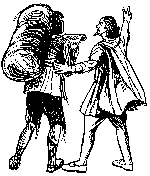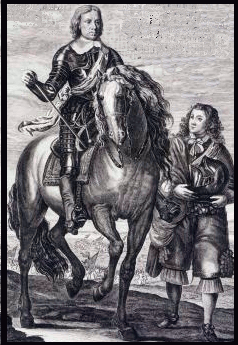
This Page Title – Men of the Awakening – William Romaine
The Wicket Gate Magazine "A Continuing Witness".
Internet Edition number 79 – placed on line July 2009
Magazine web address – www.wicketgate.co.uk

In his sketch of William Romaine in "Five Christian Leaders", J. C. Ryle uses the simile of an army to illustrate the Lord's workings in the days of the great evangelical awakening of the 18th century.
Whitefield and Wesley he likens to "spiritual cavalry, who scoured the country and were found everywhere." William Grimshaw is fancied as "an infantry soldier, who had his head-quarters at Haworth, and never went far from home." While William Romaine, he tells us, "was a commander of heavy artillery, who held a citadel in the heart of a metropolis, and seldom stirred beyond its walls." The latter picture is a graphic one and echoes the mighty thunderclaps of many of Romaine's sermons which shook the city of London during the forty-nine years of his ministry there.
Unlike Daniel Rowlands, or John Berridge, both of whom we have mentioned in previous magazines, William Romaine appears to have begun the Christian ministry as a convinced evangelical; so that, by the time he came to London, in the year 1746, he was well equipped for the work which the Lord had for his hand in that great city.
Although he was to occupy a number of pulpits before his final settlement at St. Anne's in Blackfriars, it is especially with his lectures at St. Dunstan's in Fleet Street that his name is most readily associated. These lectures were begun in the year 1749 amidst great opposition, and continued until a few weeks before his death when he had begun his eighty-first year. It was said at that time, that those who came to London came "to see Garrick act and hear Romaine preach." But popularity and conflict very often go hand in hand, and the catalogue of oppositions which Romaine encountered at St. Dunstan's might have made other men at other times turn their backs and shake the dust from their shoes.
He was only permitted to use the building from seven o'clock in the evening, and up until the clock struck that hour the church-wardens kept the doors firmly bolted. It was their hope that, by keeping the congregation standing in the cold and driving rain of winter, they could discourage the people from hearing "the fanatic," as the Rector called him. When this failed, they next refused to heat the church; and when that met with no success they then left the place in darkness, so that Romaine was forced to preach from the light of one small candle in the midst of the blackness. They underpaid him – £18 a year – they took him to court, they accused him before the Bishop, but as one biographer puts it, "Though for years his stipend was only eighteen pound he wore homespun cloth, and lived so plainly that they could not starve him out. And although they repeatedly dragged him to the courts of law they could not force him out. And though they sought occasion against him in regard to his canons, they could not get the bishop to turn him out." And so he remained as we have said, until three days before the seven weeks illness which ended his life, at the full age of eighty-one.
Two short pages such as this can never hope to record the value of this "commander of the heavy artillery" during those days of the awakening. In fact, the whole series is intended simply as an introductory handshake to a few of these mighty men of valour who preached in the eighteenth century. We recommend Bishop Ryle's "Five Christian Leaders," and from its pages we close with a short assessment of William Romaine's character and work.
"He stood in a most prominent position in London for forty-nine years, testifying the gospel of the grace of God, and never flinching for a day. He stood alone, with almost no backers, supporters, or fellow-labourers. He stood in the same place, constantly preaching to the same hearers, and not able, like Whitefield, Wesley, Grimshaw, and other itinerant brethren, to preach old sermons. He stood there witnessing to truths which were most unpopular, and brought down on him opposition, persecution, and scorn. He stood in the most public post, continually watched, observed, and noticed by unfriendly eyes, ready to detect faults in a moment if he committed them. Yet during all those forty-nine years, he maintained a blameless character, firmly upheld his first principles to the last, and died at length, like a good soldier at his post, full of days and honour. It is place and position that specially prove what we are. In England at this time there were not four spiritual champions greater and more honourable than William Romaine."

This Page Title – Men of the Awakening – William Romaine The Wicket Gate Magazine "A Continuing Witness". Internet Edition number 79 – placed on line July 2009 Magazine web address – www.wicketgate.co.uk |